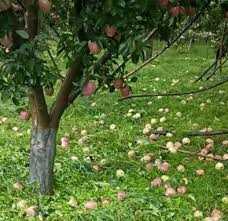
A sudden and violent hailstorm accompanied by strong winds tore through Kashmir’s major fruit-growing regions on Monday, causing massive damage to apple orchards at a critical stage of cultivation. The disaster has pushed thousands of orchardists into crisis and reignited urgent calls for the implementation of a comprehensive crop insurance scheme for the region’s horticulture sector.
The worst-hit area was South Kashmir’s Shopian district, especially the Imam Sahab belt, where villages like Nagbal, Handew, Wadipora, Alshipora, and Dasu were battered around 2:30 PM. The storm, which lasted over fifteen minutes, was marked by intense lightning and fierce winds that ravaged fruit-laden trees, snapping branches and destroying the developing apples. Growers fear the economic consequences will be steep and long-lasting.
Local orchardists described the damage as catastrophic and irreversible. For many families who rely solely on horticulture, the hailstorm wiped out an entire season’s work and income in a matter of minutes. The impact wasn’t confined to Shopian alone. Reports of similar destruction have emerged from Kulgam, Bandipora, Baramulla, Ganderbal, and parts of Handwara and Rafiabad, where gusty winds and hailstorms have caused comparable damage.
This recurring vulnerability has highlighted the lack of institutional support for Kashmir's fruit growers. The Kashmir Valley Fruit Growers Cum Dealers Union, representing thousands of orchardists, has once again pressed for the urgent introduction of a crop insurance scheme. In a statement, chairman Bashir Ahmad Basheer, who also leads the New Kashmir Fruit Association, criticized the authorities for failing to deliver on repeated promises regarding insurance coverage.
Basheer emphasized that 90% of fruit growers in the Valley are small or marginal farmers with no financial buffer. In the absence of insurance, even a single weather calamity like this hailstorm can wipe out their entire annual income, plunging families into debt.
The Union has appealed to the Lieutenant Governor of Jammu and Kashmir and the Chief Minister of the Union Territory to treat this as an emergency.
Immediate rollout of a crop insurance scheme
Distribution of protective hail nets at subsidised rates
Deployment of horticulture experts from SKUAST and the Horticulture Department to assess losses
A fair and immediate compensation package for affected growers
Farmers are increasingly anxious about the growing unpredictability of weather patterns. They say that climate uncertainty, coupled with a lack of structural reforms, has made fruit cultivation an increasingly risky livelihood. Without timely intervention and institutional safeguards, they warn that the region’s celebrated horticulture industry may not survive future shocks.
As the physical damage is still being evaluated, the emotional and financial devastation is already apparent. In Shopian’s once-thriving orchards, trees now stand stripped and broken—symbols of shattered hopes and lost livelihoods. If left unaddressed, the effects of this calamity will ripple far beyond the orchards, affecting the entire economic ecosystem that depends on Kashmir’s fruit industry.


A sudden and violent hailstorm accompanied by strong winds tore through Kashmir’s major fruit-growing regions on Monday, causing massive damage to apple orchards at a critical stage of cultivation. The disaster has pushed thousands of orchardists into crisis and reignited urgent calls for the implementation of a comprehensive crop insurance scheme for the region’s horticulture sector.
The worst-hit area was South Kashmir’s Shopian district, especially the Imam Sahab belt, where villages like Nagbal, Handew, Wadipora, Alshipora, and Dasu were battered around 2:30 PM. The storm, which lasted over fifteen minutes, was marked by intense lightning and fierce winds that ravaged fruit-laden trees, snapping branches and destroying the developing apples. Growers fear the economic consequences will be steep and long-lasting.
Local orchardists described the damage as catastrophic and irreversible. For many families who rely solely on horticulture, the hailstorm wiped out an entire season’s work and income in a matter of minutes. The impact wasn’t confined to Shopian alone. Reports of similar destruction have emerged from Kulgam, Bandipora, Baramulla, Ganderbal, and parts of Handwara and Rafiabad, where gusty winds and hailstorms have caused comparable damage.
This recurring vulnerability has highlighted the lack of institutional support for Kashmir's fruit growers. The Kashmir Valley Fruit Growers Cum Dealers Union, representing thousands of orchardists, has once again pressed for the urgent introduction of a crop insurance scheme. In a statement, chairman Bashir Ahmad Basheer, who also leads the New Kashmir Fruit Association, criticized the authorities for failing to deliver on repeated promises regarding insurance coverage.
Basheer emphasized that 90% of fruit growers in the Valley are small or marginal farmers with no financial buffer. In the absence of insurance, even a single weather calamity like this hailstorm can wipe out their entire annual income, plunging families into debt.
The Union has appealed to the Lieutenant Governor of Jammu and Kashmir and the Chief Minister of the Union Territory to treat this as an emergency.
Immediate rollout of a crop insurance scheme
Distribution of protective hail nets at subsidised rates
Deployment of horticulture experts from SKUAST and the Horticulture Department to assess losses
A fair and immediate compensation package for affected growers
Farmers are increasingly anxious about the growing unpredictability of weather patterns. They say that climate uncertainty, coupled with a lack of structural reforms, has made fruit cultivation an increasingly risky livelihood. Without timely intervention and institutional safeguards, they warn that the region’s celebrated horticulture industry may not survive future shocks.
As the physical damage is still being evaluated, the emotional and financial devastation is already apparent. In Shopian’s once-thriving orchards, trees now stand stripped and broken—symbols of shattered hopes and lost livelihoods. If left unaddressed, the effects of this calamity will ripple far beyond the orchards, affecting the entire economic ecosystem that depends on Kashmir’s fruit industry.
© Copyright 2023 brighterkashmir.com All Rights Reserved. Quantum Technologies